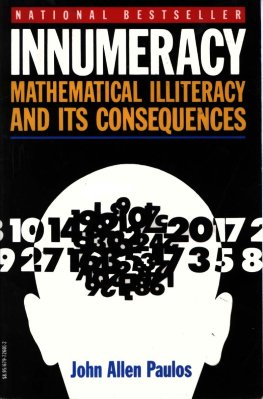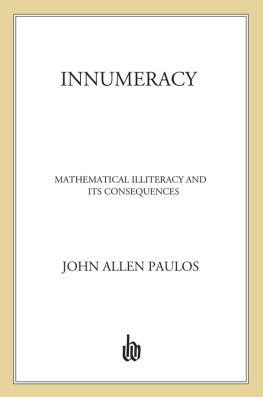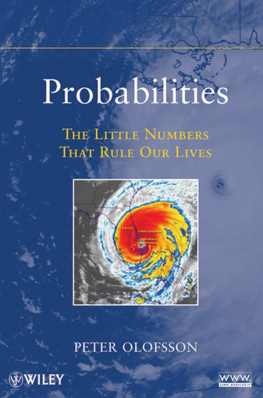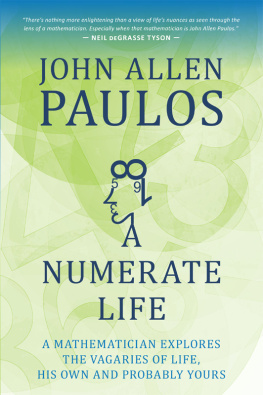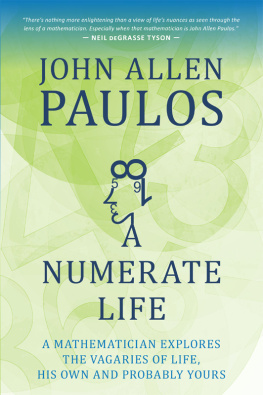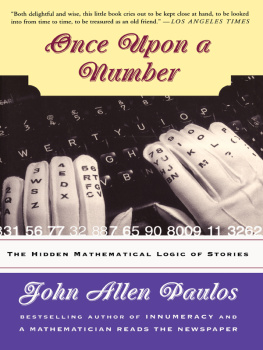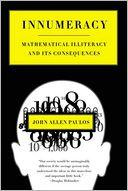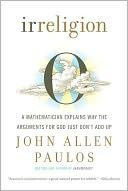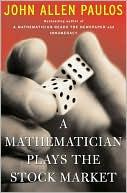John Allen Paulos
INNUMERACY: Mathematical Illiteracy and Its Consequences
"Paulos involves the reader in the fun of numeracy in his entertaining, thought-provoking book."
Christian Science Monitor
"[John Allen Paulos] takes us a couple of steps closer to numeracy, and it is all in all an enlightening place to be."
The New York Times
"Paulos gives us a readable romp across a varied mathematical landscape [He] makes numbers, probability and statistics perform like so many trained seals for the reader's entertainment and enlightenment." -The Philadelphia Inquirer
"Paulos's talent lies in his ability not only to take the reader step by step through the computations necessary to reach a probability but also to impart-with a droll humor, a lively irreverence, and a literate as well as a numerate mind-the wonder and groundedness you can derive from a quantitative way of seeing the world."
Boston Phoenix Literary Supplement
To Sheila, Leah, and Daniel for numberless reasons
"Math was always my worst subject."
"A million dollars, a billion, a trillion, whatever. It doesn't matter as long as we do something about the problem."
"Jerry and I aren't going to Europe, what with all the terrorists."
Innumeracy, an inability to deal comfortably with the fundamental notions of number and chance, plagues far too many otherwise knowledgeable citizens. The same people who cringe when words such as "imply" and "infer" are confused react without a trace of embarrassment to even the most egregious of numerical solecisms. I remember once listening to someone at a party drone on about the difference between "continually" and "continuously." Later that evening we were watching the news, and the TV weathercaster announced that there was a 50 percent chance of rain for Saturday and a 50 percent chance for Sunday, and concluded that there was therefore a 100 percent chance of rain that weekend. The remark went right by the self-styled grammarian, and even after I explained the mistake to him, he wasn't nearly as indignant as he would have been had the weathercaster left a dangling participle. In fact, unlike other failings which are hidden, mathematical illiteracy is often flaunted: "I can't even balance my checkbook." "I'm a people person, not a numbers person." Or "I always hated math."
Part of the reason for this perverse pride in mathematical ignorance is that its consequences are not usually as obvious as are those of other weaknesses. Because of this, and because I firmly believe that people respond better to illustrative particulars than they do to general exposition, this book will examine many real-world examples of innumeracy- stock scams, choice of a spouse, newspaper psychics, diet and medical claims, the risk of terrorism, astrology, sports records, elections, sex discrimination, UFOs, insurance and law, psychoanalysis, parapsychology, lotteries, and drug testing among them.
I've tried not to pontificate excessively or to make too many sweeping generalizations about popular culture or our educational system (a la Allan Bloom), but I have made a number of general remarks and observations that I hope are supported by the examples. In my opinion, some of the blocks to dealing comfortably with numbers and probabilities are due to quite natural psychological responses to uncertainty, to coincidence, or to how a problem is framed. Others can be attributed to anxiety, or to romantic misconceptions about the nature and importance of mathematics.
One rarely discussed consequence of innumeracy is its link with belief in pseudoscience, and the interrelationship between the two is here explored. In a society where genetic engineering, laser technology, and microchip circuits are daily adding to our understanding of the world, it's especially sad that a significant portion of our adult population still believes in Tarot cards, channeling mediums, and crystal power.
Even more ominous is the gap between scientists' assessments of various risks and the popular perceptions of those risks, a gap that threatens eventually to lead either to unfounded and crippling anxieties or to impossible and economically paralyzing demands for risk-free guarantees. Politicians are seldom a help in this regard since they deal with public opinion and are therefore loath to clarify the likely hazards and trade-offs associated with almost any policy.
Because the book is largely concerned with various inadequacies-a lack of numerical perspective, an exaggerated appreciation for meaningless coincidence, a credulous acceptance of pseudosciences, an inability to recognize social trade-offs, and so on- much of the writing has a debunking flavor to it. Nevertheless, I hope I've avoided the overly earnest and scolding tone common to many such endeavors.
The approach throughout is gently mathematical, using some elementary ideas from probability and statistics which, though deep in a sense, will require nothing more than common sense and arithmetic. Some of the notions presented are rarely discussed in terms accessible to a wide audience and are the kind of thing that my students, for example, often enjoy but usually respond to with: "Will we need to know that for the quiz?" There won't be a quiz, so they can be enjoyed freely, and the occasional difficult passage can be ignored with impunity.
One contention of the book is that innumerate people characteristically have a strong tendency to personalize-to be misled by their own experiences, or by the media's focus on individuals and drama. From this it doesn't necessarily follow that mathematicians are impersonal or formal. I'm not, and the book isn't either. My goal in writing it has been to appeal to the educated but innumerate-at least to those whose fear of mathematics is not so great that (num)(ber) is automatically read as (numb)(er). The book will have been well worth the effort if it can begin to clarify just how much innumeracy pervades both our private and our public lives.
1 Examples and Principles
Two aristocrats are out horseback riding and one challenges the other to see which can come up with the larger number. The second agrees to the contest, concentrates for a few minutes, and proudly announces, "Three." The proposer of the game is quiet for half an hour, then finally shrugs and concedes defeat.
A summer visitor enters a hardware store in Maine and buys a large number of expensive items. The skeptical, reticent owner doesn't say a word as he adds the bill on the cash register. When he's finished, he points to the total and watches as the man counts out $1,528.47. He then methodically recounts the money once, twice, three times. The visitor finally asks if he's given him the right amount of money, to which the Mainer grudgingly responds, "Just barely."
The mathematician G. H. Hardy was visiting his protege, the Indian mathematician Ramanujan, in the hospital. To make small talk, he remarked that 1729, the number of the taxi which had brought him, was a rather dull number, to which Ramanujan replied immediately, "No, Hardy! No, Hardy! It is a very interesting number. It is the smallest number expressible as the sum of two cubes in two different ways."
BIG NUMBERS, SMALL PROBABILITIES
People's facility with numbers ranges from the aristocratic to the Ramanujanian, but it's an unfortunate fact that most are on the aristocrats' side of our old Mainer. I'm always amazed and depressed when I encounter students who have no idea what the population of the United States is, or the approximate distance from coast to coast, or roughly what percentage of the world is Chinese. I sometimes ask them as an exercise to estimate how fast human hair grows in miles per hour, or approximately how many people die on earth each day, or how many cigarettes are smoked annually in this country. Despite some initial reluctance (one student maintained that hair just doesn't grow in miles per hour), they often improve their feeling for numbers dramatically.

